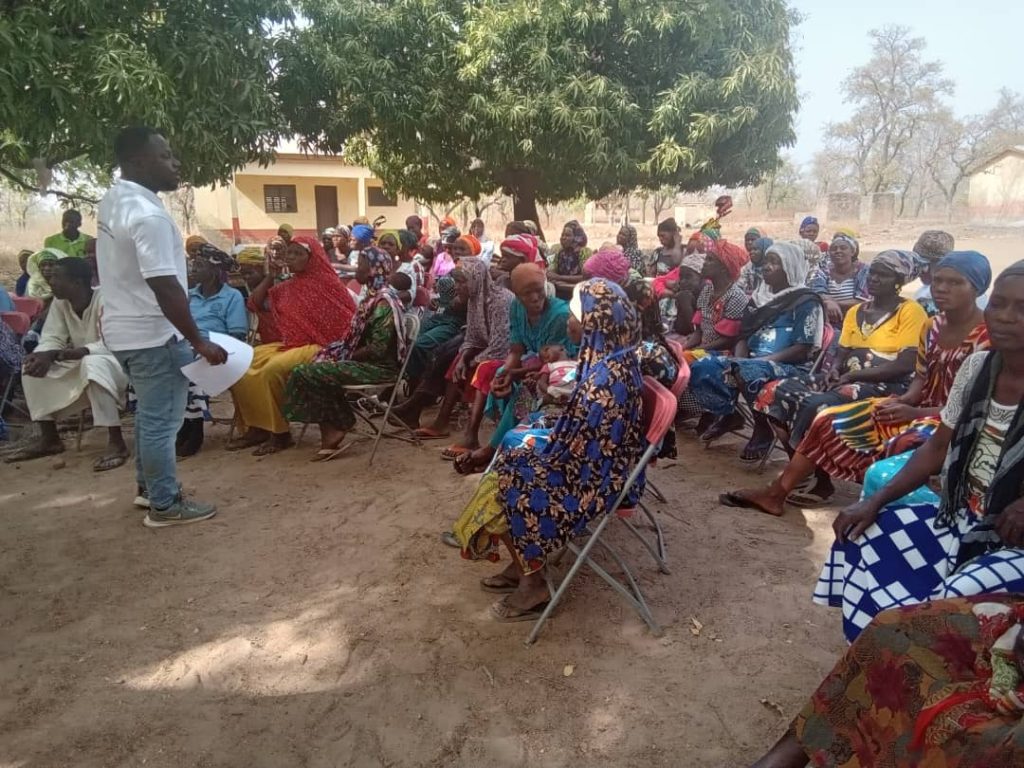A GNA Feature by Rosemary Wayo
Buffiama (UW/R), April 10, GNA – Women’s participation in agriculture-related activities in Ghana has been relatively low despite their efforts to make a mark in the sector to effectively contribute to economic growth.
A record by the World Bank estimated females’ involvement in primary agricultural production at 46.44 per cent of the total labour force.
The data indicates that access to resources such as land, and essential agricultural services is limited to many women.
Owing to the gender gap in agricultural activities, the Kosmos Innovation Centre (KIC), in partnership with Mastercard Foundation, a Canadian charity, seeks to ignite the interest of women groups to change the narrative through needs assessment-based programme interventions.
Women’s Bootcamp Project
The KIC Women’s Bootcamp project was initially designed to provide capacity-building and practical skills training for students and graduates, geared at changing their perception of agriculture and entrepreneurship.
The project seeks to invest immensely in young people, especially women, to motivate them to consider agricultural activities as worthy careers.
It has, however, expanded to adopt a community-based approach where it incorporates sustenance for women groups in entrepreneurship training at the community level.
Its beneficiaries are motivated to engage in Village Savings and Loans and other alternative livelihood programmes for female farmers outside of the planting season.
As part of the project, women are trained in soap making, baking and other skills based on individual preferences.
This is intended to complement their incomes before and after the farming season as a measure of climate adaptation.
The Bootcamp project further trains adolescents on alternative livelihood skills.
The KIC, in partnership with selected local women empowerment organisations, ensures increased women’s participation in the Agricultural Technology challenge.
This is done through an annual women’s boot camp to achieve its 50 per cent young women inclusion target.
Women-led agriculture start-ups are supported under the Bootcamp project, which aims at addressing related economic issues.
KIC’s Mandate and Bootcamp Project Objectives
The Kosmos Innovation Centre envisions a world of gender equality devoid of stereotypes and discrimination.
The organisation pursues a society where more women will participate in agriculture with a decreasing perception that agriculture is customarily a male-dominated field.

The KIC’s quest to correct cultural sensitivities associated with women in agriculture resonates with the objectives of the Bootcamp project to reduce the rate at which such conceptions deter women from exploring opportunities in the field.
Forecasts of the Women Bootcamp Project
A total of 180 Agri-startups are targeted to be empowered as well as 900 Agri-Medium and Small Enterprises supported in the four years of the project, out of which 50 per cent will be women-led businesses.
This is aimed at restructuring operations of beneficiaries to prepare them for investment opportunities.
Technical Training for Women
Women in communities in four districts within the project area were provided with technical knowledge during the first phase.
The districts were the Jirapa, Lambussie, Wa East and Sissal East in the Upper West Region, which were selected based on a recommendation from the district office of the Ministry of Food and Agriculture.
The women were trained by agricultural extension officers on Climate Change Adaptation, Record Keeping, and Group Development among other crucial areas in farming.
The technical trainings were based on the needs of the women as a farmer group, Mr Christopher Dumah, the Wa East District Agricultural Extension Officer, told the Ghana News Agency in an interview.
He said: “Before the training, there was a needs assessment to know what exactly these women need in enhancing their knowledge in farming.”
Subsequent dialogues with the women suggested that they lacked information on agronomic practices.
Mr Solomon Zekye, an Agricultural Extension Officer in the Wa East District, who was a facilitator, said technical knowledge of agricultural activities was essential in allaying the fears of women in incurring losses in agriculture and increasing interest in the sector.
Some questions posed by the women during the sessions revealed that they were ignorant of basic agricultural practices and safe use of agrochemicals, hence the training filled that gap by serving as an eye opener to those issues.
Feedback from Beneficiaries
The sessions of technical and capacity-building training have boosted the women’s knowledge of practices that will increase production and give them the confidence to adopt farming as a career.
Nimatu Widuma said as a smallholder farmer, who used fertilizer and other chemicals on her farm, the exposure had made her learn intriguing techniques, which she could apply to commercialise her farming activities.
“The few times I used chemicals, I used the chemical containers to store water and food. Now, I know it is a harmful practice.”
Ayisha Dorgo said she had been equipped to make farming a business and emphasised that lessons on record keeping provided a reorientation of farming as a business activity.
She noted that as a member of a smallholder farmer group, she was made to appreciate the need to join the group to acquire practical education on different dynamics in relation to her work.
Some young single mothers, who benefited from the training, expressed the feeling of empowerment as they detailed how the initiatives under the Bootcamp project could help them cater for themselves and their children.
GNA